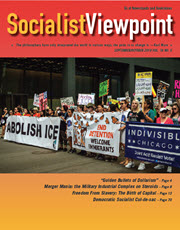Chelsea Manning Can Remain in Jail for Another Year, Judge Rules
Chelsea Manning, a former Army intelligence analyst-turned-whistleblower, may remain behind bars for up to another year and face nearly a half-million-dollars in fines over her ongoing refusal to testify before a grand jury about her disclosure of classified information to WikiLeaks.
A federal judge in the Eastern District of Virginia on Monday, August 5, 2019, denied a motion filed by Manning’s lawyers for a hearing requested to press the court to reconsider its sanctions, which include jail time—not to exceed 18 months—and financial penalties that may ultimately total around $441,000.
“I am disappointed but not at all surprised. The government and the judge must know by now that this doesn’t change my position one bit,” Manning said in a statement to Gizmodo.
Manning, 31, was taken into custody in early March after declining to answer questions before a grand jury concerning her past association with WikiLeaks, the anti-secrecy organization founded by Julian Assange, who is currently battling extradition to the U.S.
Assange faces an 18-count indictment, issued by the U.S. Justice Department this May, including alleged violations of the Espionage Act for publishing classified information that Manning provided in 2010—including thousands of secret diplomatic cables and battlefield reports—while she served as an Army intelligence analyst in Iraq.
Manning has stated that she has a moral objection to testifying before the grand jury and that no amount of jail time will compel her to testify. Legally, she can only be imprisoned as part of an effort by the court to coerce her into testifying. Her time in jail is not supposed to be punitive.
Her attorneys argue that she’s shown her resolve is unwavering, and that the sanctions are ineffective. Thus, her time in jail cannot be considered coercive, an attempt to compel her testimony. U.S. District Judge Anthony Trenga, however, says he’s convinced otherwise. On Monday, he denied Manning’s attorneys the opportunity to further argue their case before the court.
“In support of the Motion, Ms. Manning has proffered a substantial number of financial records detailing her assets, liabilities, and current future earnings,” he wrote. “The Court has reviewed these records and concludes, based on the evidence proffered, that Ms. Manning has the ability to comply with the Court’s financial sanctions or will have the ability after her release from confinement.”
Trenga added that “based upon the nature and volume of documents,” a hearing “would not aid the decisional process.”
Manning’s attorneys said the judge’s decision was “unexpected,” that she is currently “deeply in debt,” and cannot work while incarcerated. Therefore, they argued, she cannot afford the fines that may ultimately be imposed.
“Chelsea will remain confined for another year, and will face ongoing financial hardship, unless Judge Trenga or a higher court are convinced of what Ms. Manning has always publicly maintained: that the sanctions imposed will never coerce her compliance and therefore are entirely punitive,” her legal team said.
It remains unclear as to what information U.S. prosecutors hope to attain from Manning’s testimony. Her interactions with WikiLeaks were all detailed during her court-martial six years ago, and logs of her conversations with Assange are already public record.
The continued existence of the WikiLeaks grand jury itself remains a mystery given the scope of the charges already brought against Assange. No evidence presented during any previous hearings, nor any publicly available to date, suggest that Manning had interactions with anyone other than Assange himself.
While Manning’s imprisonment for civil contempt may not exceed 18 months, she could be released earlier, if the grand jury is dismissed beforehand.
—Gizmodo, August 7, 2019
Write to:
Chelsea Elizabeth Manning #A0181426
William G. Truesdale Adult Detention Center
2001 Mill Road
Alexandria, VA 22314


